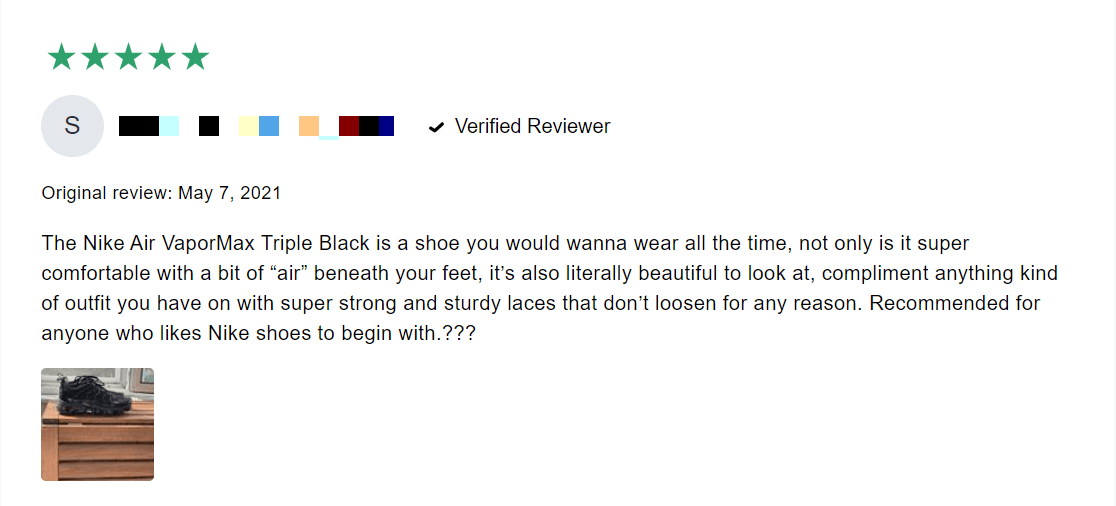-
 Published: Jun 5, 2023
Published: Jun 5, 2023
-
 11 min. read
11 min. read
-
 Sina Mchunu
Sina Mchunu Research & Tech Content Writer
Research & Tech Content Writer
- Sina is a marketing expert who specializes in SEO, AI, and digital marketing content. With over five years of experience, she’s written hundreds of pieces, spanning a variety of topics and industry niches. She loves combining her strong eye for detail and passion for storytelling in her work. You’ll find her fruit picking or horse riding at the local farm when she’s not writing.
Sales psychology is the studying of consumer habits and decision-making processes. It entails comprehending consumers’ thoughts, emotions, and behaviors throughout the sales process to influence their purchase decisions.
According to Simon Sinek, people don’t purchase what you do — they buy why you do it. Understanding what motivates a consumer to buy is crucial to making a sale.
The art of persuasion lies in studying consumer psychology and its application to the sales process. Learning what motivates customers emotionally and mentally is essential in this field.
By appealing to your client’s emotions, you can establish rapport with them and earn their confidence. Customers have more choices than ever. So, establishing this relationship is crucial in today’s market.
We’ll dig into the psychology of selling and look at some of the most effective techniques top salespeople use to persuade their clients. We’ll examine effective methods of using consumers’ consciousness to increase revenue, including the power of social proof and the value of strategic framing.
Here’s a brief outline of what we’ll discuss:
- What is sales psychology?
- Principles of the psychology of selling
- How to incorporate psychological triggers into your sales strategy
Let’s dive right in!
We post videos every Monday.
Yup. Every Monday.
Join the 12,000 marketers who get their marketing knowledge from WebFX videos.
Subscribe Now

What is sales psychology?
Sales psychology is the study of how consumers’ mental and emotional processes lead to customer purchases. The key is to imagine yourself in the consumer’s shoes and learn everything about their hopes, concerns, and motivations.
Principles of the psychology of selling
Sales professionals use these principles to influence the customer’s buying decision:
1. Reciprocity
Performing the art of reciprocity requires giving a consumer something of value in exchange for a favor. Salespeople frequently provide free trials or samples to prospective consumers in the hopes that they will purchase the complete version of the product.
Humans have an innate desire to repay kindness or favor shown to them, which is why this principle is effective. When you give something valuable away for free, the buyer feels bound to reciprocate the favor.
The exchange of commodities and services is a type of reciprocity, and it might also be excellent counsel or intriguing data that the client finds valuable. Building that level of trust with the customer over time can lead to increased sales.
You need to be sincere and not exploit the offer as a means of manipulation. Sincerity is rewarded with loyal customers, but insincerity can swiftly turn them away.
2. Scarcity
Using scarcity as a sales tactic entails establishing a feeling of urgency or uniqueness to boost demand. This strategy is frequently implemented in time-sensitive sales promotions that give the buyer a strict purchase cutoff date.
Limiting supply is another method of generating scarcity, which can persuade buyers to pay more for a commodity they assume is in great demand. Customers who are experiencing the fear of missing out (FOMO) may move swiftly and buy something they wouldn’t have purchased otherwise.
Employing scarcity, however, requires integrity and honesty. Misleading buyers about a product’s availability or worth might harm your company’s credibility and sales. As a downside, exploiting scarcity too frequently or forcefully might wear on customers, reducing its efficacy.
It is essential to strike a middle ground and leverage scarcity in a win-win way for the business and the client.
3. Authority
In the psychology of selling, authority refers to the use of prior accomplishments or recognition as a means of inspiring trust. This principle can be crucial in a sales pitch or other situations where you must establish trust quickly. Your credibility as an expert in your field will determine how seriously consumers think about your suggestions.
You can build credibility by presenting relevant work experience or academic achievements. A real estate agent could highlight their experience in the region or their status as a certified specialist in a particular property.

You can also build credibility by providing supporting facts or statistics to support your knowledge claims. This approach often includes sales performance measurements, customer satisfaction ratings, and industry trends. It doesn’t matter what strategy you employ — increasing your authority will undoubtedly increase your credibility with potential clients, which could lead to increased sales.
4. Consistency
Consistency means tailoring your sales pitches to each client by studying your target demographic in depth and over time. Consumers are more likely to purchase from you if you demonstrate that you’ve researched their needs and concerns before pitching.
A key component of sales psychology consistency is using the same voice and approach with each customer. This component entails accommodating their wants and requirements and showing empathy for them.
By continuously displaying these traits, you can differentiate yourself from aggressive salespeople and establish yourself as reliable counsel. Doing so could enhance sales and satisfaction among existing customers.
Consistency requires adjusting and refining your sales strategy in light of customer input and market fluctuations. That way, you better serve your clients by anticipating their needs and exceeding their expectations.
It also requires checking in with the buyer after the transaction to ensure everything fits their liking and lays the groundwork for a long-term partnership. The company’s income and success may increase due to customers returning and recommending it to others.
Maintaining a consistent sales message across all platforms, including social media and email marketing, can boost brand recognition and draw in new clients.
5. Liking (or rapport-building)
In sales psychology, “liking” involves developing a rapport with the consumer by finding common ground, such as interests or goals. With this method, you may gain the customer’s confidence and establish a connection.
Showing that you care about the customer’s needs and wishes can go a long way toward establishing rapport, but finding a common interest or shared experience can hit the mark.
Listening attentively to clients’ complaints and ideas is a terrific way to win their loyalty. It’s not enough to hear them out — you must also demonstrate a genuine interest in their experiences. Establishing rapport requires listening attentively and asking questions that encourage free expression.
Positivity in body language and matching the customer’s tone and speed of speaking are two other ways to win them over. Having a real connection with a potential customer is far more crucial in sales than being affable.
6. Social proof
Social proof is any evidence demonstrating a product’s reliability and quality to potential buyers. It might come in the form of reviews, testimonials, case studies, or even endorsements from popular users of a product’s social media channel.

The foundation of social proof’s persuasive power is the idea of social influence — in which individuals are swayed by the behaviors and beliefs of those in their social circle. Your business must display and promote its social proof to win over your target market and boost your chances of turning leads into consumers.
One strategy for doing so is to display positive feedback and ratings from actual customers prominently, the number of likes and shares your posts have received across various social media platforms, and endorsements from established figures in your field.
Growing your social presence with WebFX is a walk in the park.
“WebFX allows growing your social media platforms to be stress-free! They are knowledgeable and adapt to your company needs!”
Learn More About Our Social Media Services

How to incorporate psychological triggers into your sales strategy
Take a look at some of the ways to incorporate emotional appeals into your sales strategy:
- Analyze your target audience
- Identify the emotional benefits of your product or service
- Create a sense of urgency through limited-time offers or exclusive deals
- Use social proof by showcasing customer testimonials or endorsements from reputable sources
- Leverage storytelling techniques to create an emotional connection with prospects
1. Analyze your target audience
Researching your target market‘s interests, requirements, and values is the first stage in employing psychological triggers in sales. Knowing why your target audience cares about a particular issue allows you to craft messages and strategies more likely to hit home.
This approach may entail the following steps:
- Conducting market research
- Analyzing customer data
- Engaging with your audience directly through surveys or focus groups
Understanding your target market’s wants and needs will help create engaging articles. To influence your target audience effectively, you must first grasp the factors that drive them emotionally.
Focusing on the product’s safety and dependability may be more effective if your target audience prioritizes those factors. But, if they’re primarily concerned with how it will look to others, talking about the product’s high price tag or limited availability may be more effective.
Incorporating these psychological triggers into your sales strategy will help you craft a more engaging message that will stick with your audience.
2. Identify the emotional benefits of your product or service
The next step is pinpointing the intangible ways your product or service will make a difference for your clients. You can employ this information to craft a message that hits home more profoundly. Use information about your customers’ needs and wants to craft a message that speaks directly to them.
Selling a weight loss product, for instance, would profit from emphasizing the physical as well as the psychological advantages of looking and feeling good. Knowing what motivates your target market emotionally allows you to craft a message that puts things into perspective and boosts conversion rates.
Setting yourself apart from the competition by emphasizing the product’s emotional benefits instead of utilitarian ones is another way to win customers. Consumers will pay a premium for anything that makes them feel good about themselves — therefore, it’s crucial to highlight the product’s emotional advantages.
3. Create a sense of urgency through limited-time offers or exclusive deals
You can generate interest in your offering among potential buyers by showing it as a limited-time promotion that won’t be available again. This strategy can be particularly effective for high-priced items or consumers who buy on a whim.

Understanding your target market’s needs, interests, and barriers to action is essential for crafting an engaging message. To drum up holiday sales for your luxury skincare line, you can release a special holiday gift package with limited quantities, special packaging, and bonus items.
The target audience might identify with the brand if it caters to their need for relaxation and renewal during the stressful holiday season by emphasizing the mental health advantages of self-care.
If you play to their emotions, you can create a bond with your audience that extends beyond the practical benefits of your offering. The scarcity of these offers drives more immediate purchases and generates long-term interest in the company and anticipation of future products.
4. Use social proof by showcasing customer testimonials or endorsements
Promoting your limited-time offer with social evidence, such as customer endorsements or testimonials, might make it more worthwhile to potential customers. Customers put more stock in the recommendations of people like themselves, either in terms of background or hobbies.
Consumers are four times more likely to purchase a product if their friends recommend it. So, buyers may feel compelled to make a quick decision when social proof indicates that others have already made one. If you want to make the most of social proof, pick recommendations or testimonials that are pertinent, detailed, and genuine.
You can persuade your target audience to take action and buy from you if you combine the scarcity effect with the influence of social proof.
5. Leverage storytelling techniques to create an emotional connection with prospects
Your limited-time offer will impact more if you use narrative strategies to establish an emotional connection with potential clients. You may appeal to your audience’s emotions and win their trust by telling them personal anecdotes about how your product or service has benefited their lives.
A more personal relationship with your brand means more money in your pocket. By employing storytelling, you can set yourself apart from the competition and increase the allure of your time-sensitive offer.
You can develop a potent marketing approach that generates instant sales and long-term client loyalty by combining scarcity, social proof, and narrative. Consider the source’s credibility when weighing the weight of a recommendation or testimony. One way to win over skeptical consumers is to feature testimonials from respected leaders in your field.
Promote customer-generated content on social media, such as photos and videos of your product in use. This approach does double duty, inspiring and encouraging consumers to engage with your brand. These tactics to promote limited-time deals will increase conversions and build a dedicated customer base.
Tap into your audience’s psyche with WebFX
We provide marketing tactics based on psychological research into consumer habits and preferences. Our expert team will employ audience-resonating content and visually appealing and instructive images to achieve your business goals.
Understanding the psychology of your clients allows us to craft an effective marketing campaign that speaks directly to their desires and requirements. WebFX enables you to build meaningful interactions with your customers on a much more personal level, increasing revenue.
Contact us online or call 888-601-5359 to speak to a strategist about how our data-driven approach can help your business succeed.
-
 Sina is a marketing expert who specializes in SEO, AI, and digital marketing content. With over five years of experience, she’s written hundreds of pieces, spanning a variety of topics and industry niches. She loves combining her strong eye for detail and passion for storytelling in her work. You’ll find her fruit picking or horse riding at the local farm when she’s not writing.
Sina is a marketing expert who specializes in SEO, AI, and digital marketing content. With over five years of experience, she’s written hundreds of pieces, spanning a variety of topics and industry niches. She loves combining her strong eye for detail and passion for storytelling in her work. You’ll find her fruit picking or horse riding at the local farm when she’s not writing. -

WebFX is a full-service marketing agency with 1,100+ client reviews and a 4.9-star rating on Clutch! Find out how our expert team and revenue-accelerating tech can drive results for you! Learn more
Try our free Marketing Calculator
Craft a tailored online marketing strategy! Utilize our free Internet marketing calculator for a custom plan based on your location, reach, timeframe, and budget.
Plan Your Marketing Budget
Table of Contents
- What is sales psychology?
- Principles of the psychology of selling
- 1. Reciprocity
- 2. Scarcity
- 3. Authority
- 4. Consistency
- 5. Liking (or rapport-building)
- 6. Social proof
- How to incorporate psychological triggers into your sales strategy
- 1. Analyze your target audience
- 2. Identify the emotional benefits of your product or service
- 3. Create a sense of urgency through limited-time offers or exclusive deals
- 4. Use social proof by showcasing customer testimonials or endorsements
- 5. Leverage storytelling techniques to create an emotional connection with prospects
- Tap into your audience’s psyche with WebFX

Proven Marketing Strategies

Proven Marketing Strategies
Try our free Marketing Calculator
Craft a tailored online marketing strategy! Utilize our free Internet marketing calculator for a custom plan based on your location, reach, timeframe, and budget.
Plan Your Marketing Budget
What to read next





